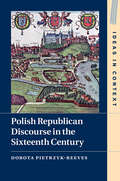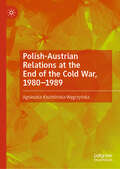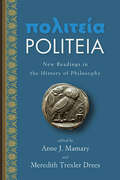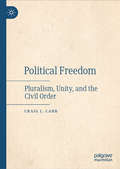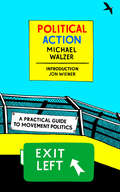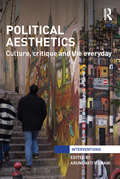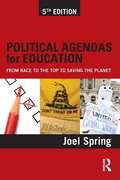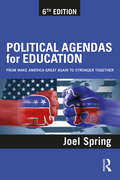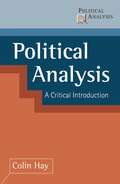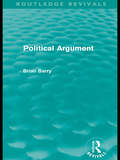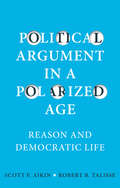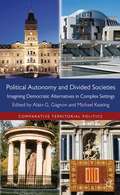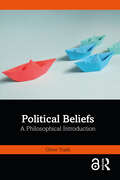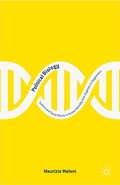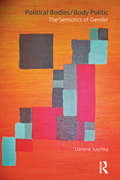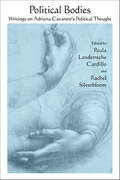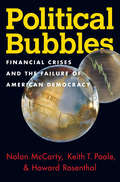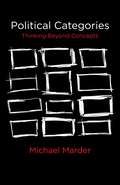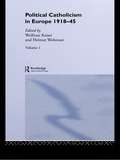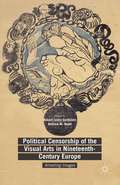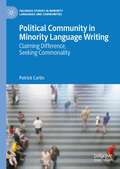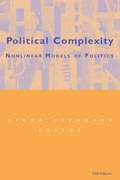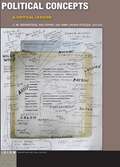- Table View
- List View
Polish Republican Discourse in the Sixteenth Century (Ideas in Context #129)
by Dorota Pietrzyk-ReevesExploring republican ideas and concepts that developed in sixteenth-century Poland under the impact of humanism and the Renaissance, as well as political and constitutional changes, this is a landmark study of republican discourse in sixteenth-century Poland-Lithuania. It provides a conceptual and contextual analysis of the rich political literature and debate which animated intellectual life and political reasoning during the Polish-Lithuanian Commonwealth and effectively demonstrates its republican character. Using a comparative perspective, Dorota Pietrzyk-Reeves situates the Polish republican discourse within both the classical and early modern republican traditions, bringing together contexts and ideas that have traditionally been overlooked by scholars of early modern Europe. In addition, it also underlines the originality of Polish concepts such as the relationship between law, liberty and virtue as key elements of a well-ordered commonwealth and the vision of a mixed respublica that also had a monarchical character. This book is an invaluable resource for anyone interested in European intellectual history and the early modern republican tradition.
Polish-Austrian Relations at the End of the Cold War, 1980–1989
by Agnieszka Kisztelińska-WęgrzyńskaThis book proposes a new historical framework for the analysis of the relationship between communist Poland and neutral Austria during the final decade of the Cold War. The tragic Polish crisis of 1980–1982 is examined within the context of Poland’s relationship with the wealthy, neutral country of Austria. By exploring the political meetings and negotiations that took place around the introduction of martial law in Poland, this book sheds light on Polish-Austrian bilaterial relations as seen from the perspective of Polish diplomatic documents. Divided into three parts, the book begins by illustrating Austria’s attitude to reforms in Poland in the early 1980s. The second part focuses specifically on the imposition of martial law in Poland, and the third part explores the cooperation between the two countries through the form of investments and environment protection. Particular emphasis is placed on Polish attempts to recruit Austrian politicians in order to overcome the political isolation in which Warsaw found itself after December 13, 1981. The author analyses the political boundaries that Austria could, and wanted to, cross, in order to help the Polish regime, offering insights into Austria’s fears of financial loss as a result of the collapse of the regime.
Politeia in Greek and Roman philosophy
by Melissa Lane Verity HarteThis is the first exploration of how ideas of politeia (constitution) structure both political and extra-political relations throughout the entirety of Greek and Roman philosophy, ranging from Presocratic to classical, Hellenistic, and Neoplatonic thought. A highly distinguished international team of scholars investigate topics such as the Athenian, Spartan and Platonic visions of politeia, the reshaping of Greek and Latin vocabularies of politics, the practice of politics in Plato and Proclus, the politics of value in Plato, Aristotle and the Stoics, and the extension of constitutional order to discussions of animals, gods and the cosmos. The volume is dedicated to Professor Malcolm Schofield, one of the world's leading scholars of ancient philosophy.
Politeia: New Readings in the History of Philosophy (SUNY series in Ancient Greek Philosophy)
by Anne J. Mamary; Meredith Trexler DreesInnovative readings and creative reinterpretations of significant works in the field of ancient philosophy.In classical Greece, the word politeia in its largest sense meant the citizens' engagement with the shared project that is the lived life of their polis, city, civic society. Ancient philosophers, poets, historians, and orators constantly reflected on what this shared project should be and how citizens could participate in it. The chapters in this collection, inspired by the work of Anthony Preus, examine some of the products of their reflections, both the written works themselves and the variety of comparative contexts into which they can be put, from the Greeks' neighboring Asian polities to contemporary philosophical engagements with similar issues. The essays in Politeia hope to inspire readers to think about their own lives in conversation with the lives of the many communities to which we belong—to not only demonstrate the idea of politeia but to bring to life politeia's connection of the individual to the collective, something that seems to be of central importance in a world of division and to be the beating heart of the discipline of philosophy.
Political Freedom: Pluralism, Unity, and the Civil Order
by Craig L. CarrThe purpose of this work is to discuss and explain the nature of political freedom. The approach is interdisciplinary, drawing from social theory, history, and law, as well as philosophy and political theory. The argument presented defends a view of political freedom as a social norm that has gained great prominence in those places where it has emerged through time as a social mechanism that supports social order and brings security to social life. Regarded as a social norm, political freedom promotes the toleration of the religious, cultural, ideological, and moral differences that generate normative conflict throughout society. The resultant understanding of political freedom therefore defends a distinction between political and personal freedom and separates the idea of political freedom from the individualism with which it is normally associated in most philosophical literature. The argument also indicates why it is appropriate to regard political freedom as a central virtue of social justice.
Political Action: A Practical Guide to Movement Politics
by Michael Walzer Jon WienerPolitical theorist Michael Walzer's classic guide is a perfect introduction to social activism, including what-to-do advice for deciding which issues to take on, organizing, fundraising, and providing effective leadership Political Action is a how-to book for activists that was written at one of the darkest moments of the Nixon administration and remains no less timely and intelligent and useful today. Michael Walzer draws on his extensive engagement in the civil rights and antiwar movements of the 1960s to lay out the practical steps necessary to keep movement politics alive both in victory and in defeat. What do people need to do when out of outrage or fear of looming disaster they come together to demand change? Should they focus on one or several issues? Should they form coalitions? What can and can’t be accomplished through electoral politics? How can movements operate democratically? What is effective leadership? Walzer addresses such questions with clarity, concision, wisdom, and wit in a book that everywhere insists not only on the centrality of movement politics to the health of democratic societies but on the deep satisfaction that is to be found there. Political Action is both an indispensable resource for activists and a lasting and inspiring summons to arms.
Political Aesthetics: Culture, Critique and the Everyday (Interventions)
by Arundhati VirmaniPolitical Aesthetics highlights the complex and ambiguous connections of aesthetics with social, cultural and political experiences in contemporary societies. If today aesthetics seems a rather overused term, mixing a variety of historical realities and complex personal states of being, its relevance as a connecting agent between individual, state and society is stronger than ever. The actual context of political and economic crisis generates new relations between official imposed aesthetics and the resistance and critiques they trigger. Considered beyond the poles of power and protest, the book examines how traditional or innovative artistic practices may acquire unexpected capacities of subversion. It nourishes the current debate around the new political stakes of aesthetics as an inviolable right of ordinary citizens, an essential element of empowerment and agency in a democratic every day. It will be of interest to students and scholars of international relations, political culture and political aesthetics, as well as critical sociology and history. It will also be useful for some broad courses in media studies, cultural studies, and sociology.
Political Affect: Connecting the Social and the Somatic (Posthumanities #7)
by John ProteviFor many philosophers, the rational cognitive (Cartesian) subject defines the human, or at least defines what humans should be. Yet some recent cognitive science, as well as the philosophy of Deleuze and Guattari, has called into question such individuality and rationality and emphasized social and emotional subjectivity. Understanding such embodied and embedded subjectivity, John Protevi argues, demands the notion of bodies politic.In Political Affect, Protevi investigates the relationship between the social and the somatic: how our bodies, minds, and social settings are intricately and intimately linked. Bringing together concepts from science, philosophy, and politics, he develops a perspective he calls political physiology to indicate that subjectivity is socially conditioned and sometimes bypassed in favor of a direct connection of the social and the somatic, as with the politically triggered basic emotions of rage and panic. Protevi's treatment of affective cognition in social context breaks new theoretical ground, insisting that subjectivity be studied both in its embodied expression and in terms of the distribution of affective cognitive responses in a population.Moving beyond the theoretical, Protevi applies his concept of political affect to show how unconscious emotional valuing shaped three recent, emotionally charged events: the cold rage of the Columbine High School slayings, the racialized panic that delayed rescue efforts in Hurricane Katrina, and the twists and turns of empathy occasioned by the Terry Schiavo case. These powerful individual and collective political events require new philosophical understanding.
Political Agendas for Education
by Joel SpringThe Fifth Edition of Joel Spring's ongoing documentation and analysis of political agendas for education reflects the major political issues in education since 2008. This edition focuses on the education sections of the 2012 Republican, Democratic, Green, and Libertarian Party platforms. Taking a fresh look at the social and political forces, educational research, and ideologies shaping the educational agendas of these political parties and a comparative approach, the book stimulates reflection and discussion. New coverage in the Fifth Edition includes: * The political coup called Race to the Top* Common Core State Standards and national testing based on the Standards* Explosion of online instruction* Debates about teacher evaluations and merit pay* Growing for-profit education industry* New agenda for American Education: Constitutional amendment; long life and happiness; environmental education Political Agendas for Education is essential reading for courses dealing with the politics of education, foundations of education, educational leadership, and curriculum studies, and for educational scholars, professionals, policymakers, and all those concerned with the politics of education in the U.S. and its consequences for schools and society.
Political Agendas for Education: From Make America Great Again to Stronger Together
by Joel SpringFollowing the epic, contentious 2016 presidential election, Joel Spring’s ongoing documentation and analysis of political agendas for education reflect the major political issues since 2012. Here he examines the 2016 education planks of the Republican, Democratic, Libertarian, and Green Parties, using their official platforms and other statements, speeches given by each candidate, and media reports and publications. Each party’s position is linked to previous political movements in education. Spring offers an alternative agenda for American schools, including a proposed education amendment to the U.S. Constitution and replacing human capital agendas with goals emphasizing education for a long life and happiness. Taking a fresh look at the social and political forces, educational research, and ideologies shaping their educational agendas and a comparative approach, the book stimulates reflection and discussion. Updates and changes in the Sixth Edition: Betsy DeVos’s education agenda supporting vouchers, free market competition and for-profit schools and its relationship to the education section of the 2016 Republican platform The important role religion and culture played in the evolution of Republican education policies after the school prayer and Bible decisions of the 1960s The influence of human capital economics on Democratic education proposals How No Child Left Behind and Democratic President Barack Obama opened doors to the growth of the for-profit education industry and investment bankers The 2016 Democratic positions on the cost of higher education and student loan debts The Democratic left as represented by the 2016 campaign of Democrat Bernie Sanders and his influence on the presidential candidate Hillary Clinton and the Democratic Party platform The education proposals of the Green and Libertarian parties
Political Analysis
by Colin Hay"Political Analysis" provides an accessible introduction to the analysis of political structures, institutions, ideas and behaviours and, above all, to the political processes through which they are constantly made and remade. ; Following an innovative introduction to the main approaches and concepts in political analysis, the text focuses thematically on the key issues which currently concern and divide political analysts, including the boundaries of the political the question of structure, agency and power the dynamics of political change the relative significance of ideas and material factors and the challenge posed by postmodernism which the author argues the discipline can strengthen itself by addressing without allowing it to become a recipe for paralysis.
Political Argument (Routledge Revivals)
by Brian BarrySince its publication in 1965, Brian Barry's seminal work has occupied an important role in the revival of Anglo-American political philosophy. A number of ideas and terms in it have become part of the standard vocabulary, such as the distinction between "ideal-regarding" and "want-regarding" principles and the division of principles into aggregative and distributive. The book provided the first precise analysis of the concept of political values having trade-off relations and its analysis of the notion of the public interest has also been significant.
Political Argument in a Polarized Age: Reason and Democratic Life
by Robert B. Talisse Scott F. AikinFrom obnoxious public figures to online trolling and accusations of “fake news”, almost no one seems able to disagree without hostility. But polite discord sounds farfetched when issues are so personal and fundamental that those on opposing sides appear to have no common ground. How do you debate the “enemy”? Philosophers Scott Aikin and Robert Talisse show that disagreeing civilly, even with your sworn enemies, is a crucial part of democracy. Rejecting the popular view that civility requires a polite and concessive attitude, they argue that our biggest challenge is not remaining calm in the face of an opponent, but rather ensuring that our political arguments actually address those on the opposing side. Too often politicians and pundits merely simulate political debate, offering carefully structured caricatures of their opponents. These simulations mimic political argument in a way designed to convince citizens that those with whom they disagree are not worth talking to. Good democracy thrives off conflict, but until we learn the difference between real and simulated arguments we will be doomed to speak at cross-purposes. Aikin and Talisse provide a crash course in political rhetoric for the concerned citizen, showing readers why understanding the structure of arguments is just as vital for a healthy democracy as debate over facts and values. But there’s a sting in the tail - no sooner have we learned rhetorical techniques for better disagreement than these techniques themselves become weapons with which to ignore our enemies, as accusations like “false equivalence” and “ad hominem” are used to silence criticism. Civility requires us to be eternally vigilant to the ways we disagree.
Political Autonomy and Divided Societies
by Michael Keating Alain-G. GagnonAn all star cast of academic experts offer an important and timely analysis of the pursuit of autonomy. They argue that it is key to move beyond the primarily normative debate about the rights or wrongs of autonomous regions on the basis of cultural concerns, instead focusing on understanding what makes autonomy function successfully.
Political Beliefs: A Philosophical Introduction
by Oliver TraldiAnyone who’s had an argument about politics with a friend may walk away wondering how this friend could possibly hold the beliefs they do. A few self-reflective people might even wonder about their own political beliefs after such an argument. This book is about the reasons that people have, and could have, for political beliefs: the evidence they might draw on, the psychological sources of their views, and the question of how we ought to form our political beliefs if we want to be rational.The book’s twenty-four chapters are divided into four larger parts, which cover the following: (1) the differences between political and other types of beliefs, (2) theories of political belief formation, (3) sources of our political beliefs and how we might evaluate them, and (4) contemporary phenomena – like polarization, fake news, and conspiracy theories – related to political beliefs. Along the way, the book addresses questions that will arise naturally for many readers, like: Does the news you choose to watch and your own social media leave you stuck in an “information bubble”? Are you committed to a certain ideology because of the history of your society? Are people who believe “fake news“ always acting irrationally? Does democracy do a good job of figuring out what’s true? Are some political beliefs good and some evil? As the book investigates these and other questions, it delves into technical, philosophical topics like epistemic normativity, the connection between belief and action, pragmatic encroachment, debunking arguments, and ideology critique. Chapter summaries and discussion questions will help students and all interested readers better grasp this new, important area on the border of politics and philosophy.Key Features Systematically covers the political turn in contemporary epistemology and integrates it with important work in other fields (like psychology and political science) In addition to deep coverage of the nature of political belief, includes material on the ethics of political belief and how we ought to form our beliefs Approaches topics that naturally interest students like political disagreement, fake news, conspiracy theories, and the morality of belief Provides a Conclusion and Discussion Questions at the end of each chapter, prompting student readers to think more clearly and deeply about the material they’ve read The Open Access version of this book, available at www.taylorfrancis.com, has been made available under a Creative Commons Attribution (CC-BY) 4.0 International license.
Political Biology: Science and Social Values in Human Heredity from Eugenics to Epigenetics
by M. MeloniThis book explores the socio-political implications of human heredity from the second half of the nineteenth century to the present postgenomic moment. It addresses three main phases in the politicization of heredity: the peak of radical eugenics (1900-1945), characterized by an aggressive ethos of supporting the transformation of human society via biological knowledge; the repositioning, after 1945, of biological thinking into a liberal-democratic, human rights framework; and the present postgenomic crisis in which the genome can no longer be understood as insulated from environmental signals. In Political Biology, Maurizio Meloni argues that thanks to the ascendancy of epigenetics we may be witnessing a return to soft heredity - the idea that these signals can cause changes in biology that are themselves transferable to succeeding generations. This book will be of great interest to scholars across science and technology studies, the philosophy and history of science, and political and social theory.
Political Bodies/Body Politic: The Semiotics of Gender
by Darlene M. Juschka'Political Bodies/Body Politic' draws on feminism, gender studies, and queer theory to examine how myth, symbol and ritual express belief systems. The book explores the operation of gender in a variety of social and historical contexts, ranging from feminist speculative fiction and systems of belief to popular culture and ancient historical texts. 'Political Bodies/Body Politic' makes an original contribution to religious and feminist studies in its examination of gender in human communication and belief systems.
Political Bodies: Writings on Adriana Cavarero's Political Thought (SUNY series in Contemporary Italian Philosophy)
by Paula Landerreche Cardillo; Rachel SilverbloomAdriana Cavarero has been, and continues to be, one of the most innovative and influential voices in Italian political and feminist thought of the last forty years. Known widely for her challenges to the male-dominated canon of political philosophy (and philosophy more broadly construed), Cavarero has offered provocative accounts of what constitutes the political, with an emphasis on embodiment, singularity, and relationality. Political Bodies gathers some of today’s most prominent and well-established theorists, along with emerging scholars, to contribute their insights, questions, and concerns about Cavarero's political philosophy and to put her work in conversation with other feminist thinkers, political theorists, queer theorists, and thinkers of race and coloniality. A new essay by Adriana Cavarero herself closes out the volume. Political Bodies ventures beyond the familiar boundaries of Cavarero's own writing and is a testament to the generative encounters that her philosophy makes possible.
Political Bubbles: Financial Crises and the Failure of American Democracy
by Keith T. Poole Howard Rosenthal Nolan McCartyHow governmental failure led to the 2008 financial crisis—and what needs to be done to avoid another similar event Behind every financial crisis lurks a "political bubble"—policy biases that foster market behaviors leading to financial instability. Rather than tilting against risky behavior, political bubbles—arising from a potent combination of beliefs, institutions, and interests—aid, abet, and amplify risk. Demonstrating how political bubbles helped create the real estate-generated financial bubble and the 2008 financial crisis, this book argues that similar government oversights in the aftermath of the crisis undermined Washington's response to the "popped" financial bubble, and shows how such patterns have occurred repeatedly throughout US history.The authors show that just as financial bubbles are an unfortunate mix of mistaken beliefs, market imperfections, and greed, political bubbles are the product of rigid ideologies, unresponsive and ineffective government institutions, and special interests. Financial market innovations—including adjustable-rate mortgages, mortgage-backed securities, and credit default swaps—become subject to legislated leniency and regulatory failure, increasing hazardous practices. The authors shed important light on the politics that blinds regulators to the economic weaknesses that create the conditions for economic bubbles and recommend simple, focused rules that should help avoid such crises in the future.The first full accounting of how politics produces financial ruptures, Political Bubbles offers timely lessons that all sectors would do well to heed.
Political Categories: Thinking Beyond Concepts
by Michael MarderWestern philosophy has been dominated by the concept or the idea—the belief that there is one sovereign notion or singular principle that can make reality explicable and bring all that exists under its sway. In modern politics, this role is played by ideology. Left, right, or center, political schools of thought share a metaphysics of simplification. We internalize a dominant, largely unnoticeable framework, oblivious to complex, plural, and occasionally conflicting or mutually contradictory explanations for what is the case.In this groundbreaking work, Michael Marder proposes a new methodology for political science and philosophy, one which he terms “categorial thinking.” In contrast to the concept, no category alone can exhaust the meaning of anything: categories are so many folds, complications, respectful of multiplicity. Ranging from classical Aristotelian and Kantian philosophies to phenomenology and contemporary politics, Marder's book offers readers a theoretical toolbox for the interpretation of political phenomena, processes, institutions, and ideas. His categorial apparatus encompasses political temporality and spatiality; the revolutionary and conservative modalities of political actuality, possibility, and necessity; quantitative and qualitative approaches to the study of political reality; the meaning of political relations; and various senses of political being. Under this lens, the political appears not as a singular concept but as a family of categories, allowing room for new, plural, and often antagonistic ideas about the state, the people, sovereignty, and power.
Political Catholicism in Europe 1918-1945: Volume 1
by Wolfram Kaiser Helmut WohnoutThis book examines the role of Catholic parties in inter-war Europe in a systematically pan-European comparative perspective. Specific country chapters address key questions about the parties' membership and social organization; their economic and social policies; and their European and international policies at a time of increasing national and ethnic conflict, and the book includes two survey chapters explaining the origins of political catholicism in 19th century Europe and comparing the parties' interwar development, and two chapters ontransnational party contacts.Along with its companion volume, Christian Democracy in Europe Since 1945, also published in 2004, students will have an abundandce of information to guide them through their studies on this fascinating subject.
Political Censorship of the Visual Arts in Nineteenth-Century Europe: Arresting Images
by Robert Justin Goldstein Andrew M. NeddIn this comprehensive account of censorship of the visual arts in nineteenth-century Europe, when imagery was accessible to the illiterate in ways that print was not, specialists in the history of the major European countries trace the use of censorship by the authorities to implement their fears of the visual arts, from caricature to cinema.
Political Community in Minority Language Writing: Claiming Difference, Seeking Commonality (Palgrave Studies in Minority Languages and Communities)
by Patrick CarlinThis book offers case studies and a comparative analysis of three authors writing in different European minority languages, exploring how they link national and context-marked political community with universal human requirements. The author examines their left-wing positions and how their writing speaks to the acceptance of difference as a necessary condition of such universal values. He presents, for the first time in English, an in-depth treatment of the writing of the Basque poet, novelist and essayist Joseba Sarrionandia (1958–) and the Catalan priest and civil disobedience author and activist Lluís Maria Xirinacs (1932–2007), whilst linking their understanding of a 'foundational universalism' with the work of Irish novelist, short-story writer and language activist Máirtín Ó Cadhain (1906–1970). The book is by its nature interdisciplinary in order to engage in a thoroughgoing comparative analysis of European language minorities, and responds empirically and theoretically to calls made recently in this regard from within critical Iberian Studies. It will therefore be of interest to students and scholars of fields such as Iberian and Celtic studies, International Relations theory, literary criticism, nationalism studies, political philosophy, as well as socio-legal and critical terrorism studies.
Political Complexity
by Diana RichardsThis collection illustrates how nonlinear methods can provide new insight into existing political questions. Politics is often characterized by unexpected consequences, sensitivity to small changes, non-equilibrium dynamics, the emergence of patterns, and sudden changes in outcomes. These are all attributes of nonlinear processes. Bringing together a variety of recent nonlinear modeling approaches, Political Complexity explores what happens when political actors operate in a dynamic and complex social environment. The contributions to this collection are organized in terms of three branches within non-linear theory: spatial nonlinearity, temporal nonlinearity, and functional nonlinearity. The chapters advance beyond analogy towards developing rigorous nonlinear models capable of empirical verification. Contributions to this volume cover the areas of landscape theory, computational modeling, time series analysis, cross-sectional analysis, dynamic game theory, duration models, neural networks, and hidden Markov models. They address such questions as: Is international cooperation necessary for effective economic sanctions? Is it possible to predict alliance configurations in the international system? Is a bureaucratic agency harder to remove as time goes on? Is it possible to predict which international crises will result in war and which will avoid conflict? Is decentralization in a federal system always beneficial? The contributors are David Bearce, Scott Bennett, Chris Brooks, Daniel Carpenter, Melvin Hinich, Ken Kollman, Susanne Lohmann, Walter Mebane, John Miller, Robert E. Molyneaux, Scott Page, Philip Schrodt, and Langche Zeng. This book will be of interest to a broad group of political scientists, ranging from those who employ nonlinear methods to those curious to see what it is about. Scholars in other social science disciplines will find the new methodologies insightful for their own substantive work.
Political Concepts: A Critical Lexicon (Idiom: Inventing Writing Theory)
by Ann Laura Stoler Adi M. OphirDeciding what is and what is not political is a fraught, perhaps intractably opaque matter. Just who decides the question; on what grounds; to what ends—these seem like properly political questions themselves. Deciding what is political and what is not can serve to contain and restrain struggles, make existing power relations at once self-evident and opaque, and blur the possibility of reimagining them differently. Political Concepts seeks to revive our common political vocabulary—both everyday and academic—and to do so critically. Its entries take the form of essays in which each contributor presents her or his own original reflection on a concept posed in the traditional Socratic question format “What is X?” and asks what sort of work a rethinking of that concept can do for us now.The explicitness of a radical questioning of this kind gives authors both the freedom and the authority to engage, intervene in, critique, and transform the conceptual terrain they have inherited. Each entry, either implicitly or explicitly, attempts to re-open the question “What is political thinking?” Each is an effort to reinvent political writing. In this setting the political as such may be understood as a property, a field of interest, a dimension of human existence, a set of practices, or a kind of event. Political Concepts does not stand upon a decided concept of the political but returns in practice and in concern to the question “What is the political?” by submitting the question to a field of plural contention.The concepts collected in Political Concepts are “Arche” (Stathis Gourgouris), “Blood” (Gil Anidjar), “Colony” (Ann Laura Stoler), “Concept” (Adi Ophir), “Constituent Power” (Andreas Kalyvas), “Development” (Gayatri Spivak), “Exploitation” (Étienne Balibar), “Federation” (Jean Cohen), “Identity” (Akeel Bilgrami), “Rule of Law” (J. M. Bernstein), “Sexual Difference” (Joan Copjec), and “Translation” (Jacques Lezra)
